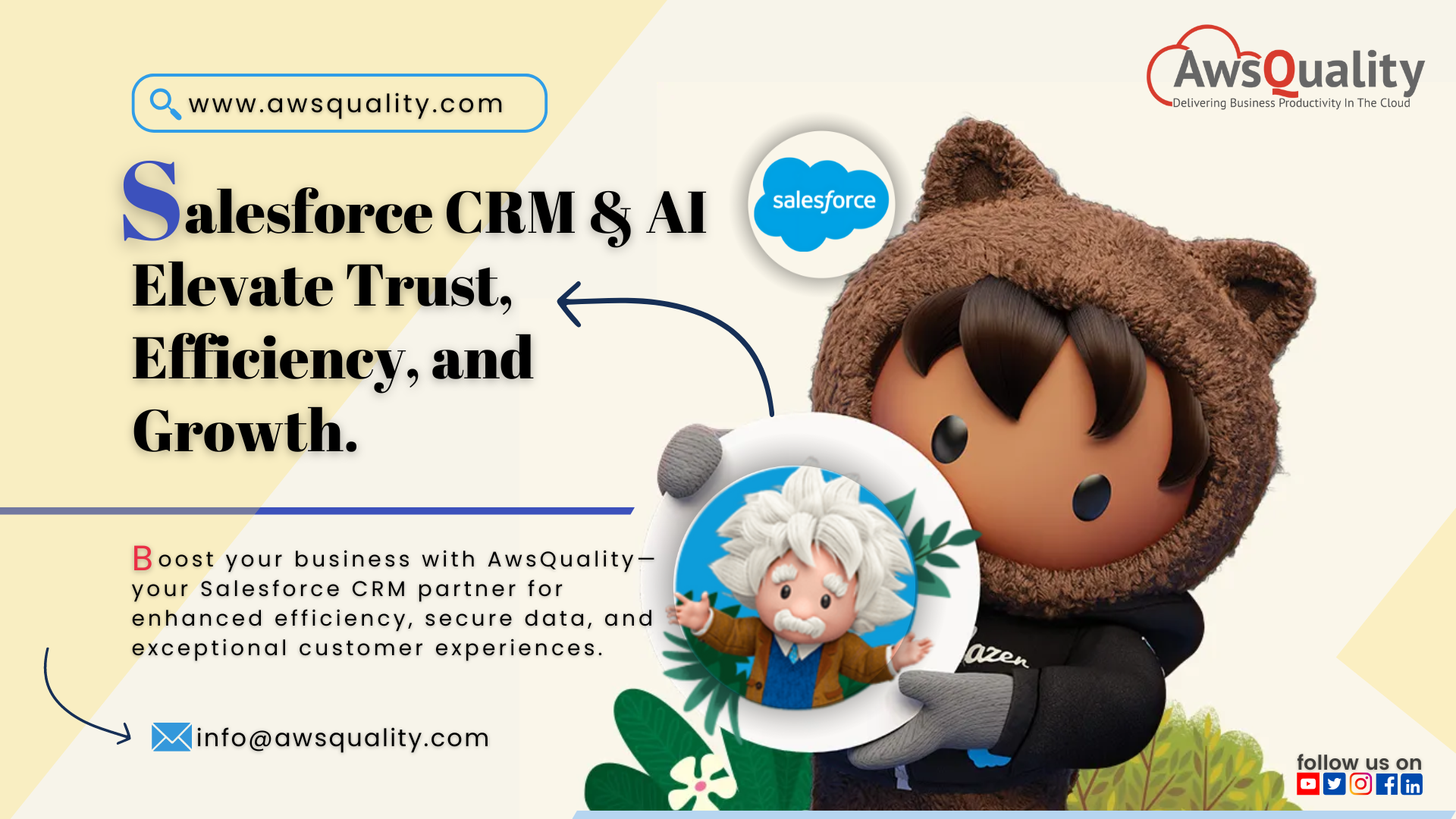
Are you prepared to advance your company’s operations? How can working with a reputable Salesforce CRM professional and integrating Salesforce Einstein AI transform your business relationships? Envision improving customer experiences while optimizing efficiency, protecting your CRM data, and making more informed judgments based on data. We at AwsQuality are here to help you realize these opportunities. By utilizing our Salesforce consulting services, you’ll dominate the competition, create enduring trust, and spur expansion. Would you like to know more? Read the article in its entirety to learn how we can change your company!
How can integrating AI, CRM, data, and trust enhance business performance?
You can connect data, AI, CRM, and trust to make your business better. AI can be used in CRM to personalize interactions, boost productivity, and make data-driven choices. For a deeper understanding, incorporate data analytics; additionally, build confidence by being dependable, secure, and transparent. Boost customer satisfaction to keep your market-leading position. Integrating data, AI, CRM, and trust can greatly enhance your business. This is the method to follow:
1. AI within CRM:
-
- AI in CRM is defined as the process of incorporating machine learning and intelligent algorithms into CRM systems.
- Increased productivity: Automate repetitive operations such as data entry, lead tracking, and email follow-ups to free up staff members for more important work.
- Superior decision-making: Learn about consumer behavior and industry trends to make data-driven choices.
- Contented clients: Use AI-powered chatbots and virtual assistants to respond more quickly and accurately.
- Personalized sales strategies, high-value lead identification, and sales funnel optimization will all contribute to higher sales.
- In order to stay competitive, offer cutting-edge experiences that either surpass or match customer expectations.
- AI improves user behaviour prediction in CRM systems, blog post ideas, and email content, for instance.
-
Information:
- Improved customer service, marketing, sales, analytics, and data management are all part of the role.
- Advantages include enhanced automation, insights, and customisation.
- Integration: To get useful insights, integrate AI with data analytics.
-
Confidence:
- Meaning: Reputation and gratifying encounters are contingent upon trust.
- Ways to establish credibility:
- Openness on data usage and procedures is a sign of transparency.
- Secure: Preserve client information.
- Be trustworthy: Always keep your end of the agreement.
- Customize communications to meet the needs and preferences of the user.
- Outstanding client experiences that encourage repeat business are the end result.
As you may recall, combining these components is essential to improving client experiences and remaining one step ahead of the competition in today’s market.
How do I integrate AI into my CRM?
Your company’s operations can be greatly improved by incorporating AI into your Customer Relationship Management (CRM) system. Using AI in your CRM can be done as follows:
-
Specify Your Goals:
Establish your precise business goals first. Identify the areas where AI can have the biggest influence, such as in decision-making, work automation, or improving customer experiences.
-
Select Appropriate Technology:
Analyze CRM programs driven by AI. Seek for systems that provide features like automation, tailored recommendations, and predictive analytics and that match your company’s requirements.
-
Data Governance and Quality:
Make sure the information you have on your customers is correct, up to date, and well-structured. For AI to be implemented successfully, high-quality data is necessary.
-
Cross-functional Team:
Put together a group comprising business stakeholders, data scientists, and IT professionals. Effective AI integration requires teamwork.
-
Discuss Ethical Issues and Bias:
Consider the possibility that AI algorithms have biases. Evaluate and address ethical issues on a regular basis.
-
Track and Assess Outcomes:
Pay careful attention to AI performance and make any required corrections. Assess the effect on sales, customer relations, and general efficiency on a regular basis.
Recall that AI in CRM isn’t only about technology; it’s also about enhancing customer experiences, optimizing workflows, and maintaining market competitiveness. 🚀
How can I protect my CRM’s data while integrating AI?
When integrating AI into your Customer Relationship Management (CRM) system, it’s imperative to protect data privacy. To that end, consider these steps:
-
Privacy and Data Accuracy Measures:
- Clean Data: Verify the accuracy, completeness, and organization of your customer data.
- Privacy Policies: Specify exactly how information will be used, saved, and safeguarded. Inform your customers about this.
- Control access: Give only authorized staff members access to sensitive information.
-
Ethics-Related Considerations:
- Bias Mitigation: Consistently check AI algorithms for prejudices. Take action against any discriminating tendencies.
- Openness: Be forthcoming about how AI is used and how decisions are made.
- Explicit consent must be obtained before processing data.
-
Safety precautions:
- Prior to transmission and storage, as well as after, encrypt data.
- Implement robust authentication procedures for authentication.
- Monitoring: Keep an eye out for security breaches at all times.
-
Selecting a Vendor:
- Select CRM and AI software from reliable suppliers who follow strict security guidelines.
Successful CRM installation requires trust. Give priority to data privacy in order to establish and preserve customer trust. 🙡️
Which standard data privacy laws should I be aware of?
It is imperative that organizations comprehend data privacy standards. These are a few significant ones:
-
General Data Protection Regulation, or GDPR
- What: All-encompassing EU legislation controlling the gathering, use, storing, and transfer of personal data.
- Date of Implementation: May 25, 2018.
- Focus: Enforces stringent regulations on entities that handle the data of EU people while safeguarding the right to privacy of individuals.
-
US Laws Regarding Data Privacy:
- Variety: Various state and industry-specific laws (such as HIPAA, FCRA, and COPPA) coexist with a single federal law.
- Modeled after the GDPR, the California Consumer Privacy Act (CCPA) grants Californians control over their personal data.
- Additional States: Analogous privacy regulations have been introduced in multiple states.
-
EU-U.S. Agreement Privacy Shield:
- Facilitates data exchanges between US and EU enterprises, is the purpose.
- Status: 2020 saw its invalidation, and as a result, businesses now rely on Standard Contractual Clauses (SCCs) to transmit data across borders.
Always keep in mind that adhering to these rules is necessary to safeguard user privacy and foster confidence.
In conclusion,
If you want to improve the performance of your organization or company, you must integrate Salesforce Einstein AI, strong data strategies, and professional CRM consulting services. As a reputable Salesforce CRM partner, AwsQuality is dedicated to assisting you in utilizing all of Salesforce’s capabilities to enhance client interactions, boost efficiency, and safeguard your information. We guarantee that your company maintains its competitive edge in the market by fostering trust and providing outstanding customer service through our all-inclusive Salesforce consulting services. Are you prepared to revamp your company? Together, let’s lead the way by getting in touch with us at AwsQuality!




